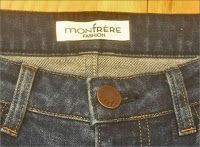The USPTO refused to register the mark MONFRÈRE FASHION for "Denim jackets; Denim jeans; Denim pants; Jeans; Men's and women's jackets, coats, trousers, vests; Pants; Shirts; Coats of denim; Denims; Jacket," finding a likelihood of confusion with the registered mark MY BROTHER for t-shirts. The application included a statement that he English translation of 'MON FRÈRE' in the mark is 'MY BROTHER.'" Applicant argued, however, that consumers would not "stop and translate" the mark, and therefore that the marks are not confusingly similar. How do you think this came out? In re Monfrere, Serial No. 88004556 (March 2, 2020) [not precedential] (Opinion by Judge Michael B. Adlin).

Because the goods are in-part legally identical, the Board presumed that they travel in the same channels of trade to the same classes of consumers. Those factors weighed heavily in favor of a finding of likely confusion. Moreover, when the goods overlap, a lesser degree of similarity between the marks is necessary to support a Section 2(d) refusal.
Turning to the marks, the Board first observed that MONFRÈRE FASHION and MY BROTHER "obviously look and sound quite different." The "crux" of the case, then, was "whether the marks convey similar meanings." The Examining Attorney argued that the doctrine of equivalents applied, but Applicant asserted that "even a person familiar with the French language would not 'stop and translate' Applicant's mark, and would instead 'take it as it is,' at least because Applicant's mark includes a combination of foreign language words and an English language word, thereby changing the commercial impression of Applicant's mark." [Emphasis by applicant].
The Board agreed with the applicant. Although French is a "common language" in this country for purposes of the doctrine of equivalents, the Board found it unlikely that "American clothing consumers, including those who speak French, would 'stop and translate' MONFRÈRE FASHION. Rather, they will 'take it as it is."
Indeed, because the term MONFRÈRE FASHION combines a French compound word with an English word, translation would in many ways be illogical. That is, typically translations involve converting words from one language into another language, but here the terms which comprise Applicant's mark are in two different languages.
* * *
In this case, because Applicant's mark is in two different languages, it is an incongruous, unitary term, such that attempting to translate it into a single language would not make sense.
Here, the entire mark conveys the the type of goods that applicant offers and signals that the goods have some connection with France or a "French" connection. A translation of the French word would destroy that meaning. The Board noted other cases in which it found that consumers would not "stop and translate" marks comprised of terms in multiple languages: e.g., LA YOGURT, LE CASE, LE CRYSTAL NATUREL.
And so the Board reversed the refusal.
The content of this article is intended to provide a general guide to the subject matter. Specialist advice should be sought about your specific circumstances.
